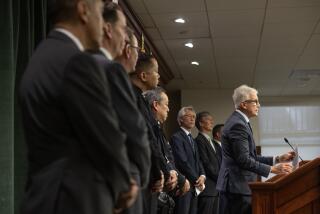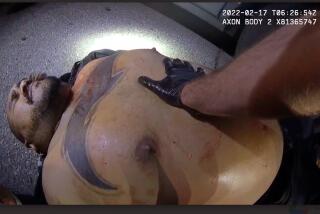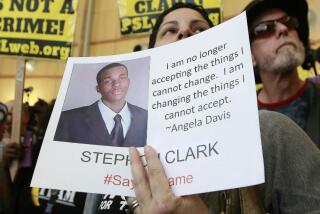Tuffree Not Eligible for Death Penalty, Defense Says
- Share via
Slain Simi Valley Police Officer Michael F. Clark’s last moments were recounted in detail during a daylong court hearing Wednesday as the capital murder trial of Daniel Allen Tuffree got set to start.
Tuffree’s defense attorneys argued Wednesday that Clark and two of his colleagues overstepped their authority and had no probable cause to be in Tuffree’s Simi Valley backyard that hot August day last year. If successful in making their case, Tuffree’s attorneys said, it would be impossible for prosecutors to ask for the death penalty.
Testimony on the motion is scheduled to resume today, and Superior Court Judge Allan L. Steele is expected to rule on the matter.
Tuffree, 49, is charged with first-degree murder in the shooting death of Clark. He is eligible for the death penalty because Clark died in the line of duty. But if lawyers can prove that Clark overstepped his authority, Tuffree would not be eligible for execution, defense attorney Howard Asher said. It would also bolster Tuffree’s argument that he was acting in self-defense when he shot and killed Clark.
“This is a violation of the Fourth Amendment, plain and simple,” Asher said outside the courtroom. The Fourth Amendment of the U.S. Constitution protects privacy rights and addresses probable cause.
*
The three Simi Valley officers were called to Tuffree’s house Aug. 4 to “check the welfare” of a subject who had been consuming Valium and beer for several days, Sgt. Anthony Anzilotti testified Wednesday. Anzilotti said Clark had pounded on Tuffree’s front door without luck and that the three officers decided to open a gate and go into Tuffree’s backyard because they feared he had overdosed and was possibly comatose.
“I felt we had a medical emergency,” Anzilotti said. “I had a responsibility to check on that person’s welfare.” That belief, prosecutors argue, allowed the officers to enter Tuffree’s backyard without a search warrant.
“The medical emergency is just an excuse to violate somebody’s rights,” Asher said.
Meanwhile, attorneys for both sides questioned Anzilotti closely about the last five minutes of Clark’s life. Anzilotti said he watched as Clark crept along the side of Tuffree’s house until he came to an open kitchen window and caught sight of Tuffree.
“Initially, [Clark] made some type of greeting--a ‘Hi’ or a ‘Hello,’ ” Anzilotti said. “[Tuffree’s] initial response or reply was ‘What do you want?’ ”
The conversation between the two lasted about 60 seconds, Anzilotti said. During that time, both men were polite but Tuffree’s voice was “slurred and slow,” Anzilotti said.
*
But that polite conversation turned to panic and chaos, Anzilotti said, when a distressed Clark demanded to see Tuffree’s hands.
“Clark asked to see Tuffree’s hands five or six times,” Anzilotti said. “The tone of his voice grew progressively more concerned each time he said it.”
Seconds later, Clark yelled “ ‘Gun,’ and I immediately heard numerous shots fired in rapid succession,” Anzilotti said.
Clark lay mortally wounded on Tuffree’s patio and a five-hour armed standoff with police began. Tuffree was superficially wounded and finally arrested after officers stormed his house.
He has pleaded not guilty to the murder and weapons charges; jury selection is expected to begin May 6.
More to Read
Sign up for Essential California
The most important California stories and recommendations in your inbox every morning.
You may occasionally receive promotional content from the Los Angeles Times.













